Does the Coalition have a future?
Dec 12th, 2008 | By Randall White | Category: Ottawa Scene FRIDAY, DECEMBER 12, 2008. 10:00 PM ET. The great Canadian political crisis of 2008, that started with the Conservative minority government’s financial update on November 27, is at last disappearing into the year-end holiday season. And already obituaries are being written for the alternative Liberal-New Democrat governing coalition, backed by the Bloc Quebecois – which seemed so surprisingly and suddenly real over the first few days of December.
FRIDAY, DECEMBER 12, 2008. 10:00 PM ET. The great Canadian political crisis of 2008, that started with the Conservative minority government’s financial update on November 27, is at last disappearing into the year-end holiday season. And already obituaries are being written for the alternative Liberal-New Democrat governing coalition, backed by the Bloc Quebecois – which seemed so surprisingly and suddenly real over the first few days of December.
The Conservatives certainly don’t like the coalition concept. Some of them say out loud that it is illegitimate. (Which constitutional lawyers will tell you is not at all the truth.) The first wave of opinion polls suggests considerable popular scepticism, outside Quebec. There are increasing second thoughts, it is said, even among the Liberals who are supposed to be leading the thing (especially since Michael Ignatieff has become Liberal leader). There are those who say there will be no coalition at all, by the time the end of January rolls around, and the dubiously prorogued Parliament resumes. But if all this is true, you do have to wonder. Why is the National Post still reporting: “Senators to be appointed before coalition gets chance“?
1. Is Stephen Harper going to appoint Senators after all?
 So it seems that Stephen Harper’s plans for step-by-step reform of the Senate of Canada are officially on hold. He actually is going fill current vacancies in the alleged house of sober second thought the old-fashioned way, through patronage appointments.
So it seems that Stephen Harper’s plans for step-by-step reform of the Senate of Canada are officially on hold. He actually is going fill current vacancies in the alleged house of sober second thought the old-fashioned way, through patronage appointments.
Moreover: “A senior government official, briefing reporters on background, said part of the reason’ for rushing to name Senate appointments now is clearly related’ to the NDP-Liberal coalition, which the Conservative government believes would put its own partisans into the current 18 vacancies and block Senate reform if it ever got into power.”
Strangely enough (or not), the most prominent website coverage on all this today is in the Central and Eastern Canadian newspapers. In the Vancouver Sun and Calgary Herald the subject is not big news.
What about the bill for hard-pressed taxpayers? According to the Canadian Press: “Appointing missing senators to cost up to $9 million.” (Not a lot, of course, but not exactly a stimulus to the broader economy either – except perhaps in Ottawa restaurants and bars, though most of those appointed may be too old to spend a lot of time in bars?)
2. Can Michael Ignatieff do what?
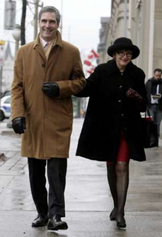 By all accounts the Liberal caucus in Ottawa is much happier now that Michael Ignatieff is the new party leader. But just what he is going to be able to do with all the current Liberal problems remains unclear.
By all accounts the Liberal caucus in Ottawa is much happier now that Michael Ignatieff is the new party leader. But just what he is going to be able to do with all the current Liberal problems remains unclear.
Recent headlines suggest a few key current events: “Harper, Ignatieff talk politics” ; “Tête-à -tête entre Harper et Ignatieff” ; “Ignatieff consults political brain trust on economy as PMO invites input” ; and “From Day 1, Ignatieff sets out to win the West.”
How “Iggy” will finally stack up against Stephen Harper in a federal election remains quite unclear. Somewhat intriguingly, both men were born in Toronto, and then went elsewhere to seek their fortunes. But Harper went to Western Canada and Ignatieff went to the United Kingdom and then the United States. In some parts of Canada at least, Harper is bound to seem more Canadian. But in other parts of the country, no doubt, that will prove no decisive attraction.
Whatever else, there are parts of Michael Ignatieff’s Wikipedia biography that do sound quite impressively exotic – from various Canadian and international angles: “Ignatieff was born in Toronto, the son of Canadian diplomat George Ignatieff and Alison Grant, and the grandson of Count Pavel Ignatiev, Minister of Education to Tsar Nicholas II and one of the few Tsarist ministers to have escaped execution by the Bolsheviks. His Canadian antecedents include his maternal great grandfather, George Monro Grant, the 19th century principal of Queen’s University. His mother’s younger brother was the political philosopher George Grant (1918-1988), author of Lament for a Nation. His great-grandfather was Count Nikolay Pavlovich Ignatyev, the Russian Minister of the Interior under Tsar Alexander III. In his book called The Russian Album, Ignatieff explores the importance of memory and obligation to ancestry in the context of his own family’s history. Ignatieff is fluent in both English and French, and has a basic knowledge of Russian, the native language of his father.”
3. Have the New Tories wounded the British monarchy in Canada too?
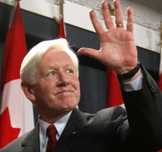 One interesting side-effect of the great Canadian political crisis of 2008 may finally prove to be its impact on the usually near-invisible if nonetheless quietly growing question of the fate of the now quite practically obsolete British monarchy in Canada.
One interesting side-effect of the great Canadian political crisis of 2008 may finally prove to be its impact on the usually near-invisible if nonetheless quietly growing question of the fate of the now quite practically obsolete British monarchy in Canada.
In fact Queen Elizabeth II has played no role at all in the unusual northern North American political turbulence of the past few weeks. But her supposed representative in Canada, Governor General Michaelle Jean (originally appointed by Canadian Prime Minister Paul Martin) certainly has been very prominent – and even crucial to the decision to prorogue Parliament.
Mme Jean’s role has also drawn attention to the question of whether it is appropriate for someone who is supposed to be representing the British monarch across the seas (as opposed to the sovereign Canadian people) to be playing such a key role in Canadian politics today. Paul Sullivan from Vancouver has opined: “Let’s retire the Queen … Canada needs to grow up and end an outdated practice.” And the old warhorse Canadian republican Allan Fotheringham has lamented: “Still colonials after all these years.”
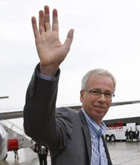 A mild irony here is that the Conservative Party of Canada today is the only party in the country that still has the preservation of Canada’s so-called “constitutional monarchy” as an objective in its party constitution. So when Paul Sullivan is vaguely disturbed by the sight of “Stephen Harper, hat in hand, tugging his forelock in the general direction of Michalle Jean, Mrs. Windsor’s representative in Ottawa,” this is presumably not exactly something Mr. Harper is altogether unwilling to do.
A mild irony here is that the Conservative Party of Canada today is the only party in the country that still has the preservation of Canada’s so-called “constitutional monarchy” as an objective in its party constitution. So when Paul Sullivan is vaguely disturbed by the sight of “Stephen Harper, hat in hand, tugging his forelock in the general direction of Michalle Jean, Mrs. Windsor’s representative in Ottawa,” this is presumably not exactly something Mr. Harper is altogether unwilling to do.
Even so, I for one would personally second the motion when Mr. Sullivan concludes by suggesting: “we should send Ms. Jean back to Radio-Canada, tell Mrs. Windsor that it’s time to retire as the Queen of Canada; thanks for the memories. Then we elect a president at large (as everyone mistakenly believes they vote for the prime minister anyway), while preserving the parliamentary democracy that we’ve come to know and love.”
(And if you want to know exactly how this is done in the real world, by other former self-governing British dominions, see the websites of the President of Ireland and/or the President of India today.)
4. How bad is the Canadian economy going to be by the end of January 2009?
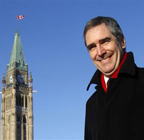 The latest opinion polls notwithstanding, the real state of Canadian politics at the end of January 2009 – when the dubiously prorogued Parliament of Canada will finally spring back to life – still seems to depend most on the state of the Canadian economy at that point in time.
The latest opinion polls notwithstanding, the real state of Canadian politics at the end of January 2009 – when the dubiously prorogued Parliament of Canada will finally spring back to life – still seems to depend most on the state of the Canadian economy at that point in time.
A column by no less prestigious a right-wing ideologue than David Frum, last Saturday, still has some provocative echoes: “Through the early fall, the Canadian economy seemed resistant to the gathering troubles of the U. S. economy. That resilience has abruptly evaporated. On Friday, Statistics Canada released jobs numbers for November: 70,600 were lost, the worst monthly report since July 1982.”
Mr. Frum went on: “Those numbers will almost certainly worsen in December and January …Recessions are dangerous times for incumbent governments … take a look at this Statscan chart: http://tiny. cc/ JMcLe. It shows Canadian unemployment rates since 1921. Now look at the post-1945 numbers. You’ll see spikes in unemployment in the following years: 1958, 1962, 1972, 1982-84, 1992-1993 … There also happened to be federal elections in 1958, 1962, 1972, 1984 and 1993. In every one of those elections, the incumbent party suffered major losses.”
So, Frum concluded: “This week’s positive poll numbers for the Conservatives will almost certainly prove fleeting … The government must do all it can to avoid an election in 2009.”
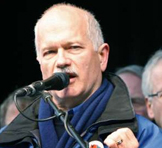 For the moment, David Frum’s musings appear as no more than moans of a fierce Old Testament prophet to whom no one is listening. Darrell Bricker, president of Ipsos Reid, said today that on the basis of still more recent poll numbers for Mr. Harper’s Conservatives: “There is no reason for him to fear an election.”
For the moment, David Frum’s musings appear as no more than moans of a fierce Old Testament prophet to whom no one is listening. Darrell Bricker, president of Ipsos Reid, said today that on the basis of still more recent poll numbers for Mr. Harper’s Conservatives: “There is no reason for him to fear an election.”
At the same time, the Chronicle Herald in Halifax is noting “Canadians in fiscal peril … Bank of Canada warns of possible debt, mortgage defaults if economic conditions worsen.” The more you read articles like this, the more you wonder whether David Frum’s deep historical prophecy won’t finally prove right.
Even such fellow neo-con ideologues understand that Stephen Harper does not at all deserve the transitory polling numbers he is getting right now. And one of the ultimate blessings of democracy is that the free and democratic people, in the midst of their many other more urgent concerns, finally do figure these things out. Just think of Brian Mulroney. (Or George W. Bush in the USA.)
The way things have been going in Canada lately, Mr. Harper may not have anywhere near that much time either – even if Michael Ignatieff really isn’t the greatest things since sliced bread (or since the death of the last Tsar in the first Russian Revolution). Don’t jump to any conclusions about the end of January, that is to say, until the end of January is finally upon us, and at least that part of the suddenly quite interesting current Canadian political mystery is clear.
DECEMBER 9: THREE CHEERS FOR BOB RAE .. one political bright light in the darkening Canadian economic gloom?
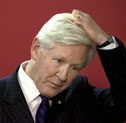 TUESDAY, DECEMBER 9, 2008. 11:30 PM ET. Bob Rae’s surprising decision earlier today, to bow out of the Liberal leadership race in favour of Michael Ignatieff, made a suitably sudden successor to yesterday’s news that Stephane Dion will be stepping down as Liberal leader.
TUESDAY, DECEMBER 9, 2008. 11:30 PM ET. Bob Rae’s surprising decision earlier today, to bow out of the Liberal leadership race in favour of Michael Ignatieff, made a suitably sudden successor to yesterday’s news that Stephane Dion will be stepping down as Liberal leader.
Whatever the initial opinion polls might say, west of the Ottawa River, the surprising sudden coming together of the opposition majority coalition over the last weekend of November 2008 showed that the 40th Parliament of Canada has more spunk than many of us expected. Now Mr. Rae’s ultimately quite public-spirited decision today has suggested that, despite all its obvious current problems, the Liberal Party of Canada still has more of its historic mojo intact than its many critics might think. (And I confess that I have to include myself among the cynical ranks of the almost astonished.)
Meanwhile, with the opinion polls apparently still ringing in his ears, Prime Minister Stephen Harper seemed a little too pleased with himself in his interview with Peter Mansbridge on the CBC News tonight. Mr. Harper has said that his minority “government is willing to make changes to accommodate the opposition.” But now he is also trying to bully the Liberals into divorcing themselves from their New Democrat allies (to say nothing of their Bloc Quebecois supporters), in the alleged higher interests of Canada (and Stephen Harper).
The newly crowned Liberal leader Mr. Ignatieff might want to remember his own recent advice. The threat of the opposition majority coalition’s taking over from the minority government is what has in fact bullied Mr. Harper into recognizing the need for more economic stimulus right now (or at the end of January at least). Mr. Ignatieff, not Mr. Harper, is hopefully the real successor to The Incredible Canadian Mackenzie King. (“The coalition if necessary, but not necessarily the coalition.”) And here’s hoping too that Bob Rae’s class act today will help his old college roomate remember that “the coalition if necessary” is still important not to forget.
DECEMBER 5: MORE POLLING DATA MAKES QUITE CLEAR HARPER HAS WON FIRST BATTLE .. more or less
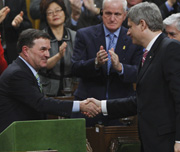 FRIDAY, DECEMBER 5, 1 PM ET. Sometimes you win in politics, and sometimes you lose. If you can’t accept that, you are no democrat. Sometimes when you lose, it’s so clear that it’s easy to accept. You just go away and get ready to fight another day. And so a wave of opinion polls this morning have rather massively strengthened the point we heard over dinner last night. For the moment at any rate, the cross-Canada public quite clearly likes Stephen Harper’s minority Conservatives better than it likes those of us who became instant supporters of the instant majority Opposition coalition, that suddenly appeared in the federal Parliament a week ago now, in response to the most absurd power-politics calculations of Mr. Harper’s career.
FRIDAY, DECEMBER 5, 1 PM ET. Sometimes you win in politics, and sometimes you lose. If you can’t accept that, you are no democrat. Sometimes when you lose, it’s so clear that it’s easy to accept. You just go away and get ready to fight another day. And so a wave of opinion polls this morning have rather massively strengthened the point we heard over dinner last night. For the moment at any rate, the cross-Canada public quite clearly likes Stephen Harper’s minority Conservatives better than it likes those of us who became instant supporters of the instant majority Opposition coalition, that suddenly appeared in the federal Parliament a week ago now, in response to the most absurd power-politics calculations of Mr. Harper’s career.
If a fresh federal election were held today, several polls now show that Mr. Harper would win a percentage of the cross-Canada vote in the mid-40s range. It is true enough that this amounts to no more than John McCain won, in the US presidential election he quite clearly lost a month ago. But in Canada’s current federal electoral system, with five parties competing for the electorate’s attention, this is almost certainly enough to give Mr. Harper the majority of seats in the Canadian House of Commons that he just failed to win this past October 14. And, if they continue over the next 50-odd days of Canada’s undemocratically prorogued Parliament, opinion poll results like these are going to wear down the resolve of all three coalition partners. Meanwhile, Canada has just shown its biggest monthly job loss in 26 years.
1. Regional and other variations
Politics in Canada always has it vast subtleties for the country’s unsung legions of political junkies, of course. And even these latest rather decisive polling results are far from unambiguously glowing for the Harper Conservatives. A Strategic Counsel poll which shows 45% for the Conservatives if yet another federal election were held today, e.g., also shows that: “Slightly more than half of respondents (55 per cent) feel that Canada is on the wrong track, and only 33 per cent feel that the country is on the right track.” Similarly, an Ipsos Reid poll that shows 46% for the Conservatives in a fresh election also shows that when Canadians are asked who is most responsible for causing the present crisis in Ottawa, “49% blame Prime Minister Stephen Harper and the Conservatives, while 45% blame the Opposition Parties.”
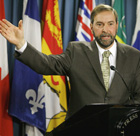 There are as well in virtually all the polls that have now surfaced some interesting regional variations in support for the proposed Liberal-New Democrat coalition, backed on key measures by the Bloc Quebecois. And they are rather different than many might think, based on all the tired old stereotypes that this current crisis should, I think, be prompting all of us to start re-examining for the good of our personal political health, etc. The great dividing line in the country today, it turns out, is the Ottawa River – and not the border between Ontario and Manitoba. As explained in the Vancouver Sun, e.g.: “Support for the coalition was highest in Quebec at 50 per cent, followed by 44 per cent in Atlantic Canada.” Or, in the parallel words of the National Post: “a slim majority of Quebecers and Atlantic Canadians appeared to support the coalition, but … nearly two of three Canadians from Ontario to the West Coast would rather see Prime Minister Stephen Harper fight to continue governing.”
There are as well in virtually all the polls that have now surfaced some interesting regional variations in support for the proposed Liberal-New Democrat coalition, backed on key measures by the Bloc Quebecois. And they are rather different than many might think, based on all the tired old stereotypes that this current crisis should, I think, be prompting all of us to start re-examining for the good of our personal political health, etc. The great dividing line in the country today, it turns out, is the Ottawa River – and not the border between Ontario and Manitoba. As explained in the Vancouver Sun, e.g.: “Support for the coalition was highest in Quebec at 50 per cent, followed by 44 per cent in Atlantic Canada.” Or, in the parallel words of the National Post: “a slim majority of Quebecers and Atlantic Canadians appeared to support the coalition, but … nearly two of three Canadians from Ontario to the West Coast would rather see Prime Minister Stephen Harper fight to continue governing.”
So what does all this mean for those of us who still do support the coalition concept (even if we also agree that it needs better leadership – and much better communications skills and so forth)? One thing that strikes me a little is that the concept has so far fared best in what might be called the oldest parts of the country, in Atlantic Canada and Quebec, where the subtleties of the French-English relationship in our history, among other things, are perhaps better understood than in places farther west. (A certain sort of cynic might also urge that the regions east of the Ottawa River have traditionally been almost congenitally or geographically less wealthy than the regions further west – starting with the old Canada West that is now Ontario – and thus more responsive to the coalition’s message of greater government support in economic hard times.)
2. Bob Rae’s new role and the coalition as a weapon of defence
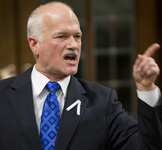 As far as the coalition leadership goes, Jane Taber at the Globe and Mail is reporting today that: “Bob Rae is preparing a coast-to-coast campaign to sell Canadians on the concept of a coalition government, taking over as chief salesman and manoeuvring around Stphane Dion, whose leadership is becoming increasingly irrelevant.” Ms. Taber is also reporting that: “Several MPs suggested to Mr. Dion Thursday that a new leader [of the Liberal Party] should be in place by January in the event the government is defeated over the budget, and the Governor General grants the Prime Minister dissolution [and thus yet another fresh federal election] rather than choosing the coalition government.” At the same time both Liberal Party leadership front runners Michael Ignatieff and Bob Rae “dismissed any notion of replacing Mr. Dion before the May leadership convention.” A Rae strategist explained that “Mr. Rae isn’t even bothering to worry about a leadership change … We can’t wait around for that because if we tie our view on the coalition to sorting out leadership mechanics, the whole thing is going to fall apart. So Rae is just saying, Gun the engine, man, let’s go.'”
As far as the coalition leadership goes, Jane Taber at the Globe and Mail is reporting today that: “Bob Rae is preparing a coast-to-coast campaign to sell Canadians on the concept of a coalition government, taking over as chief salesman and manoeuvring around Stphane Dion, whose leadership is becoming increasingly irrelevant.” Ms. Taber is also reporting that: “Several MPs suggested to Mr. Dion Thursday that a new leader [of the Liberal Party] should be in place by January in the event the government is defeated over the budget, and the Governor General grants the Prime Minister dissolution [and thus yet another fresh federal election] rather than choosing the coalition government.” At the same time both Liberal Party leadership front runners Michael Ignatieff and Bob Rae “dismissed any notion of replacing Mr. Dion before the May leadership convention.” A Rae strategist explained that “Mr. Rae isn’t even bothering to worry about a leadership change … We can’t wait around for that because if we tie our view on the coalition to sorting out leadership mechanics, the whole thing is going to fall apart. So Rae is just saying, Gun the engine, man, let’s go.'”
I certainly wouldn’t pretend to understand what all this means at the moment myself. From secret sources inside the local New Democrat organization here in my hometown, I have heard that some party activists “may feel that by building the coalition they will be assisting Bob Rae’s Liberal leadership bid. And Bob Rae as Liberal leader is not something partisan NDPers, amongst others, really look forward to.”
As both Michael Ignatieff and Stephane Dion have urged too, whatever else, the threat of forming a majority opposition coalition that could assume the reins of government is the one tool all three opposition parties have recently discovered for exercising some control over the ongoing friendly dictatorship of Prime Minister Stephen Harper.
3. Some further strategic calculations
Personally, the one thing which remains utterly clear to me is that over the past week and a half or whatever it is, I have lost all my faith of any sort whatsoever in Mr. Harper. I altogether agree with the 47% of Canadians in the current Strategic Counsel poll who believe that Mr. Harper “can no longer be trusted to lead the government” – as opposed to the 51% who still feel “he can be trusted..” On a similar basis, and for what it’s worth (which is of course nothing at all, except to me), I remain quite resolved to support the concept of a majority opposition coalition government in the 40th Parliament of Canada – so long as there is anything in the real world on the west bank of the Ottawa River capable of being supported. (And of course, while at the same time turning all my personal substantive attention to the key current issues of our increasingly struggling economy, especially here in my home region north of the Great Lakes.)
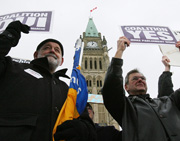 At the same time, I will confess that this initial wave of almost stunningly pro-Harper opinion polls has begun to sew the germs of another kind of strategic thought in my mind. If by the end of January the Canadian people still seem to be showing the same degree of support for Mr. Harper and his party that they are showing now, I am starting to think it might still make some sense, strictly from the standpoint of the forces of progress and the broader Canadian public interest, for the opposition majority to defeat the government right away when the House returns at the end of January. Mr. Harper in such circumstances will no doubt want yet another fresh federal election. And I think there’s a case for letting him have it.
At the same time, I will confess that this initial wave of almost stunningly pro-Harper opinion polls has begun to sew the germs of another kind of strategic thought in my mind. If by the end of January the Canadian people still seem to be showing the same degree of support for Mr. Harper and his party that they are showing now, I am starting to think it might still make some sense, strictly from the standpoint of the forces of progress and the broader Canadian public interest, for the opposition majority to defeat the government right away when the House returns at the end of January. Mr. Harper in such circumstances will no doubt want yet another fresh federal election. And I think there’s a case for letting him have it.
The crux of the case is that Stephen Harper will never be able to run any kind of stable minority government anywhere. It is just beyond the resources of his personality. And so if the Canadian people (or some suitably strategic fraction thereof – certainly it will be less than a thoroughly democratic popular majority, but that alas does seem to be how our current system works) really do want Mr. Harper to govern Canada strictly as he chooses and sees fit, they ought to give him the majority of seats in the Canadian House of Commons he so covets. This is the only way, it seems almost certain to me now, after the past week and a half, that Prime Minister Harper will ever be able to run a stable federal government in Canada, at a difficult time of economic stress and strain – without recurrent political crises, and waves of mean-spirited ill-will and raw dysfunctionality spreading out from the Langevin Block and engulfing the nation’s capital.
4. As matters stand
In this case as well Mr. Harper can do exactly as he sees fit with the challenging Canadian economy, from coast to coast to coast, and take all the responsibility for whatever may happen to us on this front over the next difficult few years. And the Canadian people can judge his performance and his alone on this front, and vote accordingly in subsequent elections.
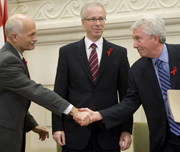 Meanwhile, the Liberals and the New Democrats can go back to starting to resolve their own many current internal problems as credible representatives of the progressive option in a largely progressive country. Perhaps the brief experience of the coalition in late 2008 (and early 2009?) will have some benign long-term benefits for both of them. And perhaps the Bloc Quebecois can go back to its mysterious work of figuring out a credible role for a Quebec sovereigntist party in the federal government of Canada. For a brief few moments over the past week or so, it suddenly seemed as if all three of these parties in Ottawa were magically being offered a fast way out of all their current problems, that almost no one really expected. Now it almost as suddenly seems that none of this is going to come true.
Meanwhile, the Liberals and the New Democrats can go back to starting to resolve their own many current internal problems as credible representatives of the progressive option in a largely progressive country. Perhaps the brief experience of the coalition in late 2008 (and early 2009?) will have some benign long-term benefits for both of them. And perhaps the Bloc Quebecois can go back to its mysterious work of figuring out a credible role for a Quebec sovereigntist party in the federal government of Canada. For a brief few moments over the past week or so, it suddenly seemed as if all three of these parties in Ottawa were magically being offered a fast way out of all their current problems, that almost no one really expected. Now it almost as suddenly seems that none of this is going to come true.
Or is it? Who really can say? One of the fascinating things about the past week and a half is how it has shown that Canadian politics can be much more interesting (as well as more dangerous), and more full of unexpected possibilities, than we thought. Maybe we the Canadian people are finally just starting to grow up, at last. And maybe things will change very dramatically again over the next month and a half. And there will be yet another fresh federal election sometime in 2009, in the midst of increasingly difficult Canadian economic challenges which Mr. Harper and Mr. Flaherty and Mr. Prentice and so forth finally do not seem up to at all. And the Liberals and New Democrats (under some kind of fresh leadership somewhere?) will each win enough seats to actually form a majority coalition government, without the support of the Bloc Quebecois? After what has just happened in Ottawa, who really feels confident enough to even just guess at where things will be this time next year – regardless of what some wave of opinion polls from yesterday say, right now?
DECEMBER 4:Â SECOND BATCH OF POLLING DATA SAYS HARPER HAS WON FIRST ROUND .. MAYBE?
 THURSDAY, DECEMBER 4, 2008. 10 PM ET. It’s been a bad day for anyone who doesn’t like Stephen Harper. To start with, he managed to convince Governor General Michaelle Jean to prorogue Parliament until January 26, 2009. (The headlines in the US papers have been more open about the banana-republic side of the story: “Canadian leader shuts Parliament to keep power,” the Washington Post declared. Or, as the New York Times put it: “Canadian Parliament Closed in Bid to Keep Prime Minister in Power.”)
THURSDAY, DECEMBER 4, 2008. 10 PM ET. It’s been a bad day for anyone who doesn’t like Stephen Harper. To start with, he managed to convince Governor General Michaelle Jean to prorogue Parliament until January 26, 2009. (The headlines in the US papers have been more open about the banana-republic side of the story: “Canadian leader shuts Parliament to keep power,” the Washington Post declared. Or, as the New York Times put it: “Canadian Parliament Closed in Bid to Keep Prime Minister in Power.”)
Then, just around dinner time in the bad old East at least, CBC News announced the results of a new opinion survey on the great Canadian political crisis by EKOS Research. Among other things, the survey asked “If a federal election were held tomorrow, which party would you vote for?” And, leaving out the 10.2% of the sample who were undecided, the Canada-wide results among so-called decided voters were Conservatives 44.0%, Liberals 24.1%, New Democrats 14.5%, Bloc Quebecois 9.2%, and Green Party 8.1%. If you include the undecided in the calculations, the situation looks a little less grim for Mr. Harper’s opponents, but not much (39.5% Conservatives, 21.6% Liberals, 13.1% NDP, 10.2% undecided, etc.)
* * * *
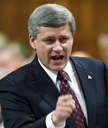 The regional breakdown on the EKOS election question is a bit interesting. Support for the Harper Conservatives is of course highest in Alberta (75.1%) and Saskatchewan and Manitoba (56.7%). Intriguingly, it is actually a bit higher in Ontario (49.0%) than in British Columbia (47.3%). It is lowest of course in Quebec (20.2%). And in the often forgotten region of Atlantic Canada the Liberals alone (38.8%) actually did somewhat better than the Conservatives (36.5%).
The regional breakdown on the EKOS election question is a bit interesting. Support for the Harper Conservatives is of course highest in Alberta (75.1%) and Saskatchewan and Manitoba (56.7%). Intriguingly, it is actually a bit higher in Ontario (49.0%) than in British Columbia (47.3%). It is lowest of course in Quebec (20.2%). And in the often forgotten region of Atlantic Canada the Liberals alone (38.8%) actually did somewhat better than the Conservatives (36.5%).
Those who worry about the Bloc Quebecois as some great force for separatism in Canada nowadays might also want to note that it had only 37.4% of the EKOS sample in Quebec (with the Liberals next at 25.4%, then the Conservatives at 20.2%, and the NDP at 10.4%).
Right at the start of the current great Canadian political crisis, not much more than a week ago, there were those who urged that Stephen Harper was engineering the whole thing once again – so he could call yet another federal election, and finally get his majority government. And the way things work in Canada’s current somewhat twisted electoral system, the share of the vote he seems to be getting in this latest EKOS poll could indeed give him a majority of seats in the Canadian House of Commons, if a fresh election were called right now.
You only have to read a little further below, in the article for December 3, to appreciate that a person with my kinds of political opinions is bound to be disappointed by these kinds of polling results – especially on the day that Stephen Harper managed to prorogue Parliament, to escape being defeated by the majority of elected MPs in a confidence vote this coming Monday. (And, as already alluded to, those who have claimed that a “three-headed” opposition coalition replacing the Harper government would make Canada look like a banana republic, ought to think again. It is the suspension of our parliamentary democracy for some 52 days, in order to let the minority government of the day stay in power, that really does the trick.)
* * * *
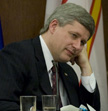 It may be grasping at straws. But the Harper Conservatives could of course suffer in future opinion polls because of today’s prorogation.
It may be grasping at straws. But the Harper Conservatives could of course suffer in future opinion polls because of today’s prorogation.
It is true the EKOS poll also showed that as a “Preferred solution for current political impasse” 37% of its respondents chose “Parliament taking a break for a month or so to see whether the Conservatives can get the confidence of parliament when it comes back into session.”
But, though it doesn’t seem to be on the paper’s website any longer, earlier today and yesterday it was reported that almost 60% of respondents answered No to the Calgary Herald online poll question “Should the Governor General prorogue Parliament, if the Prime Minister requests it?”
The Harper Conservatives, logically at any rate, are at least going to have a harder time arguing that the proposed Liberal-New Democrat Coalition, backed by the Bloc Quebecois, is somehow anti-democratic, now that they have done such an unquestionably anti-democratic thing as shutting down Parliament to avoid defeat by a majority of MPs on a confidence vote. (Even if there is also some practical logic to a time out from the current impasse in Ottawa.)
On the other hand, there seems almost an instant veritable flood of media intelligence now on how the Coalition is already “coming apart at the seams,” at least within the Liberal Party. If this is what in fact happens over the next several weeks, like others I will find it rather sad. Whatever its faults – and any political entity that springs up so quickly will have a host of imperfections – “the Coalition” has struck me as encouraging (like others again), as noted below.
Whatever else, quite unexpected circumstances (i.e. Mr. Harper’s uber-aggressive and in too many unnecessary parts hyper-ideological “fiscal update” last Thursday) finally prompted three of the four warring political parties in the Canadian House of Commons today to agree to work together in a quite constructive way – on the crucial problems of economic development that Canada, like so many other places, must face up to right now.
* * * *
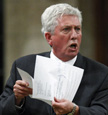 This is, I think, what the Canadian people really do want to see happen in Ottawa, in principle. And I also think the idea that there is some radical danger to a strong and united Canadian future from having Gilles Duceppe and the Bloc Quebecois supporting the proposed Liberal-New Democrat Coalition in some systematic way is profoundly mistaken.
This is, I think, what the Canadian people really do want to see happen in Ottawa, in principle. And I also think the idea that there is some radical danger to a strong and united Canadian future from having Gilles Duceppe and the Bloc Quebecois supporting the proposed Liberal-New Democrat Coalition in some systematic way is profoundly mistaken.
The truth is exactly the opposite. Jack Layton, who grew up in Montreal, is at least right about this side of the story. The Stephen Harper who grew up in Toronto and moved to Calgary is wrong. (Although a somewhat earlier Stephen Harper, who recognized the “Quebecois as a nation within a united Canada,” seemed to me a much smarter guy on this front, who has now disappeared into his own overweening and congenitally mendacious raw ambition.)
Whether the virtues of what the very embryonic and fragile opposition majority coalition of the past week began can grow into something a healthy majority of the Canadian people feel they can support in a practical way is of course another question. And it is part of the very strange way things often work in politics that it seems a much more open question even today than it was yesterday, or the day before.
I still think it is too early to give up hope altogether on what has struck me as, in some ways at any rate, a promising beginning. But, as an aspiring political realist, I would also agree that if “the Coalition” (or even what Mr. Harper was so hyperbolically calling the “Separatist Coalition” just yesterday) is going to survive and even prosper into the new year, a few things probably do have to happen.
* * * *
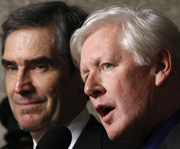 The first of them is almost certainly that Stephane Dion has to resign as leader of the Liberal Party of Canada, and make way for an emergency party convention to chose a new leader, say sometime early in January.
The first of them is almost certainly that Stephane Dion has to resign as leader of the Liberal Party of Canada, and make way for an emergency party convention to chose a new leader, say sometime early in January.
A second thing that has to happen is some quite dedicated work among both Liberals and New Democrats – and the Bloc Quebecois as well, for that matter – fleshing out the kind of economic development strategy that can help bring some forward motion, especially to those parts of the country that are starting to feel real economic pain right now. The resource-industry parts of the country that are in less trouble at the moment, but may be falling into the same box as everyone else even as we speak, need to be shown that the Coalition understands their interests too, and will be giving them all the attention and care they deserve. (And copies of this work could be politely passed along to Mr. Harper, just to show that the growing opposition majority coalition is still trying to co-operate with a congenitally arrogant and un-co-operative minority government.)
Finally, even though the New Democrats give the Coalition (and thus the Liberals, some among them might especially try to remember) a more vigorous presence in Manitoba and British Columbia than seems to be recognized in much current debate, something obviously needs to be done to give the whole enterprise much more Western Canadian allure. If it were up to me (which of course it isn’t remotely, and no doubt for various very good reasons), I would just have the Coalition steal Mr. Harper’s current Senate reform plans, holus bolus – i.e. both term limitations and “consultative elections” for fresh Senate appointments. You can rightly enough say this will never go down in Quebec. But I would try to cover this angle by promising as well that in some final Senate reform scenario the new allocation of seats would clearly recognize that Quebec is not a province like the others – and that, as Mr. Harper has already taught us so constructively, the Quebecois are a nation within a united Canada.
Whether any of these things – or indeed anything remotely like any of them – has any chance of getting up and running over the next few weeks I of course have no real idea at the moment. But, as I say, I am personally not going to give up all hope on the coalition concept just yet. It still seems to me far too promising for the longer term future. The only thing that I still do feel I really have given up hope on altogether is Mr. Harper himself.
DECEMBER 3 : FIRST POLLING DATA ON POLITICAL CRISIS IN OTTAWA DOESN’T SEEM TO HELP ANYONE TOO MUCH?
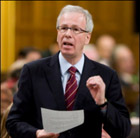 WEDNESDAY, DECEMBER 3, 2008. 12:30 AM ET. An Angus Reid Strategies survey for CTV News has now provided the first glimmerings of early Canada-wide public opinion on the Canadian political crisis that Prime Minister Stephen Harper has suddenly unleashed upon our home and native land. The survey involves an online poll conducted on December 1 and 2. And while it suggests that the pro-opposition-coalition forces have slightly more Canada-wide support than Mr. Harper’s Conservative minority government at the moment, there appears to be no unambiguous good news for anyone.
WEDNESDAY, DECEMBER 3, 2008. 12:30 AM ET. An Angus Reid Strategies survey for CTV News has now provided the first glimmerings of early Canada-wide public opinion on the Canadian political crisis that Prime Minister Stephen Harper has suddenly unleashed upon our home and native land. The survey involves an online poll conducted on December 1 and 2. And while it suggests that the pro-opposition-coalition forces have slightly more Canada-wide support than Mr. Harper’s Conservative minority government at the moment, there appears to be no unambiguous good news for anyone.
Very quickly, some 35% of Canadians, on this first tea-leaf reading, are saying the Conservatives “should continue to govern,” while 40% want change. If the opposition majority in the 40th Parliament elected just this past October 14 does manage (or is allowed ) to defeat the government this coming Monday, December 8, 37% of Canadians would like to see the government replaced by an opposition coalition, 32% would prefer another election, and 24% are not sure. However, in case you think the potential fledgling Liberal-New Democrat coalition, backed by the Bloc Quebecois, should suddenly start cheering, 64% of Canadians are “uncomfortable with [Stephane] Dion as leader of the government,” and 57% are “worried about the Bloc Quebecois becoming involved in the federal government.”
Polling data in matters of this sort is of course subject to a host of reservations – some of which will no doubt become all too apparent as the results of more such polls are made public over the next short while. But information of this sort does give us some vaguely more objective sense of popular opinion than our private conversations, and/or radio phone-in shows and comments from readers of newspapers and nowadays all manner of online Internet publications.
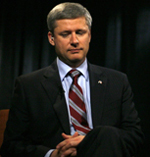 In purporting to analyze such things as polling data, one should similarly make clear one’s own personal biases, which readers can then take into account in their own evaluations of the analysis. And in this context I will just quickly say that I count myself among the almost instant supporters of the almost instant Dion-Layton-Duceppe opposition majority coalition that has arisen with such surprising dispatch, following the incendiary “fiscal update” introduced by Mr. Harper’s new minority government last Thursday. My essential argument here would be that this resolution of the sudden crisis in Ottawa probably holds out the best prospect of some predictable period of stable federal government, at a time of increasing economic stress.
In purporting to analyze such things as polling data, one should similarly make clear one’s own personal biases, which readers can then take into account in their own evaluations of the analysis. And in this context I will just quickly say that I count myself among the almost instant supporters of the almost instant Dion-Layton-Duceppe opposition majority coalition that has arisen with such surprising dispatch, following the incendiary “fiscal update” introduced by Mr. Harper’s new minority government last Thursday. My essential argument here would be that this resolution of the sudden crisis in Ottawa probably holds out the best prospect of some predictable period of stable federal government, at a time of increasing economic stress.
I also like to think of myself as a not unreasonable person. While I am not any kind of ideological conservative, I don’t have any overwhelming partisan convictions in Canadian party politics either. And I have lived most of what now seems an increasingly long life in Ontario, which at least thinks of itself as usually putting Canada first (however much that may surprise those who live in other parts of the country).
I like to think of myself as a political realist as well. Judging mostly from the incessant TV coverage lately, there now seems to be a growing consensus among political professionals of almost all stripes that Prime Minister Harper is finally going to seek a prorogation or temporary shutdown of the Canadian House of Commons, until the end of this coming January, say, to prevent the immediate defeat of his government in a vote of no confidence. Personally I think this is an altogether arbitrary and anti-democratic gesture that defies the ordinary rules and traditions of our Canadian parliamentary democracy. But I note that people who usually have much more influence over such things than I do increasingly argue that some “cooling off” period is needed in the present crisis. And some form of prorogation probably is the best way of providing this. (Though I think myself that this will also just perpetuate the current instability.)
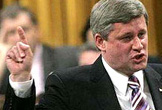 If this is what is going to happen, what is a person with views such as mine to make of the Angus Reid Strategies survey for CTV News? To start with, I think it shows that those of us who have taken some encouragement from the prompt and impressive way in which the Liberals, New Democrats, and Bloc Quebecois have come together, in an effort to put an end at last to Mr. Harper’s now apparently quite congenital sophomoric, destabilizing, and destructive bullying of the Canadian body politic, should not give up hope. We should not back down from our own democratic principles and convictions, and we should continue to resist being bullied ourselves by over-aggressive right-wing partisans, who speak for no more than some 35% of the Canada-wide electorate. We do, after all, on the evidence of the Angus Reid survey, speak for at least a few more Canadians ourselves. And putting Canada and the public interest first cannot really mean that we just have to shut up, and let Mr. Harper do whatever he wants to do.
If this is what is going to happen, what is a person with views such as mine to make of the Angus Reid Strategies survey for CTV News? To start with, I think it shows that those of us who have taken some encouragement from the prompt and impressive way in which the Liberals, New Democrats, and Bloc Quebecois have come together, in an effort to put an end at last to Mr. Harper’s now apparently quite congenital sophomoric, destabilizing, and destructive bullying of the Canadian body politic, should not give up hope. We should not back down from our own democratic principles and convictions, and we should continue to resist being bullied ourselves by over-aggressive right-wing partisans, who speak for no more than some 35% of the Canada-wide electorate. We do, after all, on the evidence of the Angus Reid survey, speak for at least a few more Canadians ourselves. And putting Canada and the public interest first cannot really mean that we just have to shut up, and let Mr. Harper do whatever he wants to do.
(It is also interesting, by the way, that according to the survey a “full 75 % thought the government should implement a stimulus package as soon as possible, while 17 per cent disagreed” – and this is essentially the position of the Liberal-New Democrat coalition.)
One thing I think all this means is that if there is in fact going to be some sort of prorogation of the House before next Monday, the proponents of the present opposition majority coalition should nonetheless resolutely stick together, and defeat Mr. Harper’s minority government when it finally gets up its nerve to face the House again at the end of January, or whenever it is. To me what Mr. Harper did in his government’s fiscal update this past Thursday has finally shown quite definitively that he is a an almost tragically mercurial and ultimately destructive political leader – the complete opposite of a “steady hand at the tiller,” and almost certainly the last thing our country needs in a time of increasing economic stress and strain.
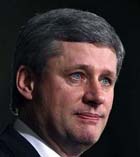 At the same time, the Angus Reid survey does raise some very serious questions about Stephane Dion as leader of the opposition majority coalition. You might dismiss these questions (as Bob Rae has done, e.g.) by stressing that M. Dion will be passing the leadership on to someone else early in May. But if there is going to be a so-called cooling off period over the next few months, the Liberals might want to use this time to choose a new leader, before the House meets again in the New Year.
At the same time, the Angus Reid survey does raise some very serious questions about Stephane Dion as leader of the opposition majority coalition. You might dismiss these questions (as Bob Rae has done, e.g.) by stressing that M. Dion will be passing the leadership on to someone else early in May. But if there is going to be a so-called cooling off period over the next few months, the Liberals might want to use this time to choose a new leader, before the House meets again in the New Year.
Similarly, the Angus Reid survey also points out that: “In Ontario, where the Liberals traditionally pick up the lion’s share of their votes, 60 per cent said they would be uncomfortable with Dion as prime minister. In Alberta, the Conservative heartland, it was 83 per cent.” From this and many other sources, it is already clear enough that – even though New Democrats bring more Western Canadian MPs to the Liberal-New Democrat coalition than the Liberals have by themselves – there is much scepticism in the West about the extent to which such a coalition would respect the interests of Western Canada. Again, if there is going to be a so-called cooling off period over the next few months, this is another area where coalition proponents could very usefully be doing some extra policy work.
Finally, the Angus Reid survey makes clear too that someone needs to be explaining the role of the Bloc Quebecois in the coalition much better – and needs to be showing how this really redounds to the great benefit of a strong and united Canadian future, regardless of what the always ebullient and charming M. Gilles Duceppe might say himself, for who knows just what twisted personal purposes. (And this equally applies to the rumoured coalition endorsement from no less a Quebec literary lion than Jacques Parizeau tomorrow – or is it today?)
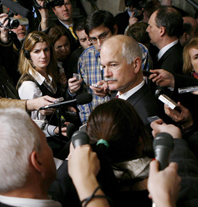 Of course, who knows what is really going to happen at this quite interesting if also in so many ways distressing juncture in the long and often enough turbulent history of Canadian federal politics? As an analyst I would certainly agree that so many utterly surprising things have happened over the past week or so as to make the next week or so radically unpredictable.
Of course, who knows what is really going to happen at this quite interesting if also in so many ways distressing juncture in the long and often enough turbulent history of Canadian federal politics? As an analyst I would certainly agree that so many utterly surprising things have happened over the past week or so as to make the next week or so radically unpredictable.
As an ordinary interested Canadian citizen, however, I do find myself agreeing with Bob Rae that with what even some conservatives of various stripes have called Mr. Harper’s astoundingly dumb fiscal-update intervention of last week, something has “clicked” or snapped or changed forever – in my mind too. Whatever else may or may not be true (and acknowledging that he has shown some interesting and more impressive sides as well), I can no longer personally see how a political leader like Stephen Harper can ever provide a diverse and geographically vast country like Canada with any kind of stable democratic government.
Randall White is the author of a number of books on Canadian politics and history, including Voice of Region: The Long Journey to Senate Reform in Canada, and Ontario Since 1985.

